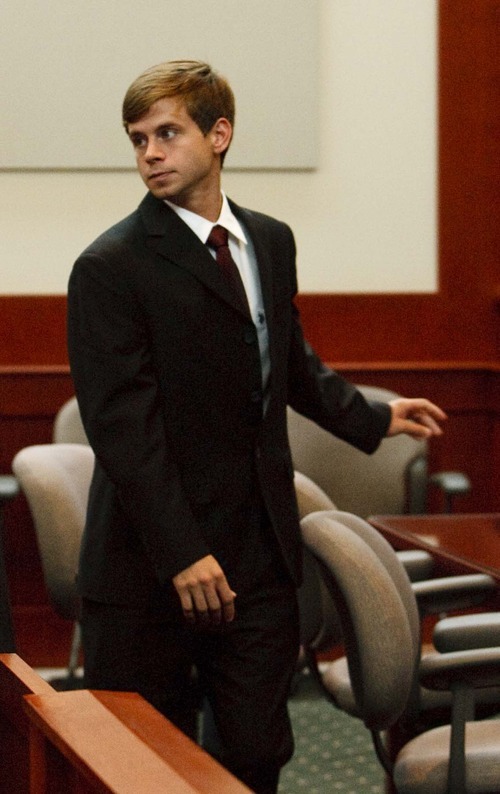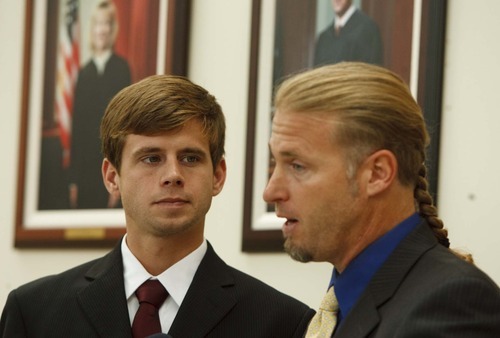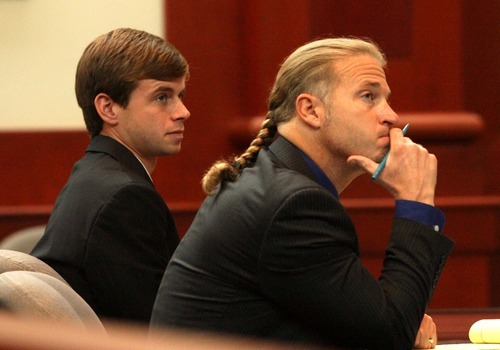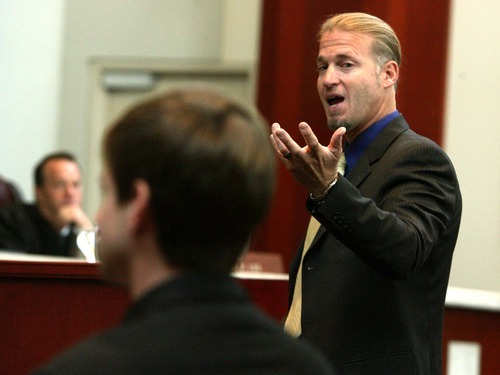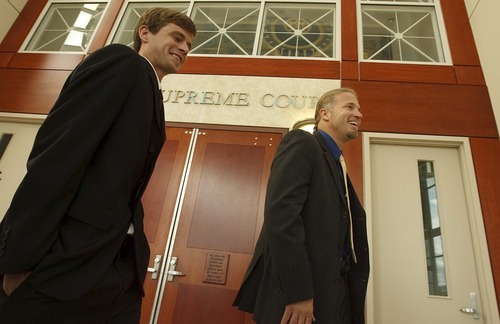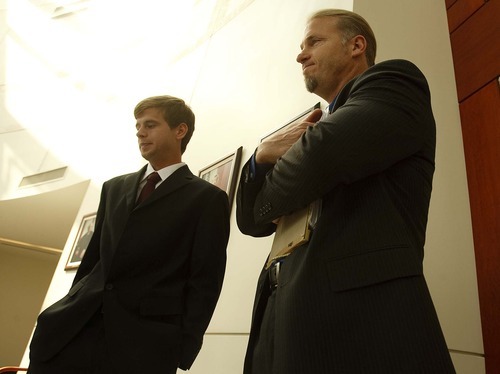This is an archived article that was published on sltrib.com in 2011, and information in the article may be outdated. It is provided only for personal research purposes and may not be reprinted.
Ramsey Shaud admits the circumstances were not perfect. He wasn't even sure he loved Shasta B. Tew.
Still, when Shaud learned in 2009 that Tew was pregnant as a result of their casual relationship but didn't want to be a mother, he stepped up.
Shaud told Tew he wanted to be a dad and would raise the child, with help from his family.
But Tew, then 19, apparently didn't like that idea and, as she began pursuing adoptive parents for the coming baby, Shaud moved quickly to protect his parental rights. Shaud, who was 22, learned he needed to sign with the Putative Father Registry in Florida, their home state, so he would be notified of any proposed adoption. It turned out to be a simple process: He printed out a form he found online and sent it in, along with the $20 filing fee.
Related story • Utah adoption law: model for nation or unjust burden? • http://bit.ly/vFuYQ8
Five months later, Tew's mother hand-delivered to Shaud a terse three-line note about his ex-girlfriend's plan to visit Arizona and Utah for the holidays. Shaud feared — rightfully, he says — that the real intent of the trip west was to give birth in a state where he was less likely to be able to assert any claim to the child.
That same day, Shaud had no trouble finding a form for Arizona's registry online; he printed it, filled it out and mailed it in. But despite hours spent dissecting the Utah Department of Health's website, which he figured was the logical place to look, Shaud was unable to locate a similar form or information about what he needed to do here.
That's because Utah, unlike most states with registries aimed at unmarried fathers, doesn't make a form or directions on how to proceed available online. In fact, the phrase "putative father," used in state law to describe an unwed biological father, isn't mentioned anywhere on the websites of the health department or Office of Vital Records and Statistics, the agency charged with maintaining Utah's registry. Utah law requires that forms be made available through local health departments, but office policy is not to do so, according to Director Janice Houston.
"The state makes the form available at the [Utah] Department of Health, but you have to pick it up in person, which is impossible for a father who lives out of state," said Joshua Peterman, an attorney who has three active cases involving unmarried fathers.
Shaud, a resident of Crestview, Fla., is one of a string of men who say Utah intentionally makes it difficult to protect their rights when they oppose adoption.In fact, unmarried fathers face a hodgepodge of approaches across the country regarding their rights. A Salt Lake Tribune review found Utah is not the only state where determining how to protect those rights is difficult — a problem some experts say would be solved by creating a national putative-father registry.
—
'Draconian consequences' • After he failed to turn up helpful information on the Utah website, Shaud searched the Internet for "how to prevent adoption in Utah" and discovered a website created by Cody O'Dea of Wyoming, detailing his own and numerous other fathers' unsuccessful fights to stop or undo adoptions in Utah.
"I thought, 'Oh geez,'" said Shaud.
His next step was to hire an attorney and engage in what has so far proved to be an unsuccessful effort to undo the adoption of his daughter, who was born in Utah on Jan. 15, 2010, and whom he has never seen. The Utah Supreme Court heard an appeal in Shaud's case on Sept. 6 and it will likely be months before the court issues a decision.
"I just want my little girl more than anything," said Shaud, whose experience spurred him to go to college to pursue a law degree. "I never thought it would come down to this."
If the court's past rulings are any indication, Shaud's odds of success are slim.
Utah requires unmarried fathers to strictly follow a process that includes filing a paternity action, registering with the putative father registry, providing a detailed child care plan and paying or attempting to pay pregnancy-related expenses. Most often, fathers lose because they don't meet Utah deadlines, as happened in Shaud's case. A lower court judge ruled his consent to his daughter's adoption was not required because he didn't meet a filing deadline — a delay Shaud argues was caused by Utah's four-day workweek and a federal holiday.
But some of the more than 25 higher court rulings in Utah since 1959 have turned on other missteps in the process, including some one justice described as "very minor issues of noncompliance."
In 2008, Nikolas Thurnwald lost his case because he didn't get an amended court document notarized or explain who would tend the child while he was at work. That same year, a father identified in court documents only as "C.C.D" declared he would assume full financial responsibility for the child but lost because he did not get a court order of child support or detail what would happen to the child if he were deported.
"There is no question that Utah has the most restrictive laws on asserting an unmarried father's rights," said Clark Nielsen, a Salt Lake City attorney who has worked with unmarried fathers in the past. "I can see there are some advantages to that as to what the state perceives as its interests and getting fathers to step up to the plate and so on."
But, Nielsen added, "It has become so restrictive that people choose to come to the state to cut off the boyfriend or whatever, and that has draconian consequences."
On Dec. 15, attorneys representing John Wyatt of Woodbridge, Va., filed a petition with the U.S. Supreme Court asking it to review two questions related to his failed bid to stop his daughter's adoption in Utah. The petition asks the court to consider whether Utah violated a federal parental kidnapping law by ignoring custody rulings issued in Virginia and whether Wyatt's constitutional rights were violated by denying him an opportunity to object to his daughter's adoption, particularly given his timely compliance with his own state's putative father law.
"The birth of the child and the whole plan for adoption was hidden from John — in fact, he was misdirected as to what was going on," said Stan Phillips, an adoption attorney in Tyson's Corner, Va., and co-counsel on the writ filed by the Washington, D.C.-based firm Crowell and Moring. "In Utah, birth fathers must come up with every possible argument before you even know what is going on in the case, and that is just unconstitutional."
Wyatt also has filed a federal lawsuit against Act of Love, the adoption agency; Larry Jenkins, the agency's attorney; and the adoptive parents, alleging a vast conspiracy exists in Utah to take children from unwed biological fathers. Jenkins, who is listed in court records as an attorney for the agency or adoptive parents in one-third of the cases reviewed by The Salt Lake Tribune for this series, declined to comment because of the lawsuit.
Adoption proponents would like more state laws, as well as any federal law, to mirror Utah's approach, as Daniel Reese, former development director for the National Council For Adoption, noted in a 2006 speech in Salt Lake City: "While we must respect the rights of biological fathers, we must find the way for a quick and permanent solution for these children . . . Putative father registries like the one in Utah offer the best solution."
Utah lawmakers first enacted a statute requiring putative fathers to file a notice asserting their parental rights in 1975. The U.S. Supreme Court affirmed the constitutionality of such registries in 1983, upholding a New York law that was similar to Utah's adoption statute.
A decade later, more state legislatures moved to enact putative father registries after a pair of heart-wrenching, protracted legal battles over infants handed over to adoptive parents at birth and then, years later, returned to their biological parents.
—
Registries vary • Despite the increase in registries, figuring out what to do in some states to receive notice of an adoption proceeding is like running a marathon obstacle course; even experts have come to different conclusions when trying to decipher state laws. The Salt Lake Tribune reviewed websites, statutes and contacted officials in some states to compile its own breakdown of state laws and assess availability of information.
The Tribune found there are 30 states with registries maintained by a government agency or court; most provide online information and forms. Utah is among the handful of states that do not provide that easy access. In most states with a registry, an unwed father must file only with the appropriate state agency; in a few — such as Utah, Idaho and Missouri — the unmarried father must both register and initiate a court action, which often brings the expense of hiring an attorney.
In states with registries, if an unmarried father fails to act, he loses any right to contest an adoption. Utah law considers an unmarried father to be on notice, from the moment he engages in a sexual relationship with a woman, that a pregnancy and adoption may occur and that it's his duty alone to protect his rights.
But public awareness of registries and their role in protecting rights is often lacking.
"You can't sign a registry if you don't know you are supposed to," said Adam Pertman, executive director of the Evan B. Donaldson Adoption Institute, based in New York. He adds that, by design or happenstance, registries touted as protecting unmarried fathers' rights "instead appear, in practice, to often cut men out who might have been interested in being let in."
Shaud's home state of Florida has one of the most father-friendly approaches in the nation, with its registry listed on the state's Office of Vital Statistics website and a printable form available in English, Spanish and Creole. Information about the registry must be disseminated via health class curricula, hospitals, adoption agencies, libraries and even at motor vehicle offices.
But proponents of a national registry say the process is far more difficult for unmarried fathers in Utah and many other states — and can be nearly insurmountable for a man who has no knowledge of when or where a mother has given birth.
At present, there is no uniformity to how unmarried fathers are referenced, what these registries are called or who oversees them. The unmarried father, for instance, may be referred to as alleged, presumed, reputed, natural or putative. A registry may be administered by a human resources or a health department, the state's child welfare agency or, as in Utah, Arizona and Georgia, the office of vital records. In South Carolina, the registry itself is known as the "Responsible Father Registry"; in Iowa, it's a "Declaration of Paternity Registry." In Arizona, the form is a "Notice of Claim of Paternity"; New York calls it a "Notice of Intent to Claim Paternity of a Child Born Out of Wedlock." Oregon maintains a "Notification File" for petitions in "filiation proceedings."
In states with registries, statutes use similar language to place the burden on an unwed father to act in a specific time frame to protect his rights and receive notice of any adoption proceeding. But deadlines vary widely. In Utah, a father must act prior to the mother giving consent or relinquishing the baby, which can happen 24 hours after giving birth, or by the first business day after the child's birth, at which point the placement is final. In Michigan it is before birth, while New Mexico sets the deadline at 10 days following birth; Texas requires action no later than 31 days after birth.
—
A national approach • This disparate approach leads people like Mary Beck, a law professor at the University of Missouri, to advocate for a national registry.
"That is the only way we can protect fathers and adoptions in interstate adoptions," said Beck, who has drafted statutory language for some states to use in creating registries. "The national registry is intended to address problems arising when conception, birth, placement and adoption filings occur in any combination in more than one state."
Sen. Mary Landrieu, D-La., has introduced legislation to create a national putative father registry in Congress twice, only to have it stall in committee. She'll try again this year, according to staff, and plans to draw more attention to the effort.
Mark Demaray, president of the American Academy of Adoption Attorneys, said within the adoption community, "most people would like some certainty, and that is what's lacking without some uniform registry."
"If a guy wants to step up and take responsibility, he should have a path," Demaray said. "There's not much of a downside to it, in most of our views [though] it might change the law in some states, like Utah, where it might make it more difficult to do an adoption."
Shaud counts himself among such responsible fathers,saying that had there been a national registry in place when his case began, "all this could have been resolved."
The Center for Family Policy & Research said a national registry gives even greater privacy and safety to a birth mother "because she does not have to identify the possible father nor inform the father of her pregnancy" — an important consideration in cases of rape, abuse or instances when a father may be married to someone else.
But the registry has opponents, including Erik L. Smith, a paralegal and third-year law student in Ohio who became an expert on the issue after waging his own custody fight.
For one thing, he is dubious because groups like the National Council for Adoption, whom he considers "anti-father," support it. A national registry would likely have "too many loopholes and be "essentially unenforceable," Smith said.
"I don't trust it," he said. "If a national registry can really work, I'm all for it. But enacting a national registry that does not work will do more harm than good."
brooke@sltrib.com
Twitter: Brooke4Trib —
What Utah law requires of unmarried, or so-called putative, fathers
From within Utah
A birth mother may consent to an adoption or relinquish an infant as soon as 24 hours after giving birth, and the decision is final. An unmarried father residing in Utah who wants to protect his parental rights must do the following either before that happens or, if the birth occurs on a weekend or holiday, within one business day:
File a paternity action in a Utah court stating he is "willing and able" to have full custody and will pay child support, pregnancy-related and childbirth expenses. It also must detail a plan for the child's care.
File a "notice of commencement of paternity proceeding" with the Office of Vital Statistics.
Prove he paid for a reasonable share of the mother's pregnancy-related and childbirth expenses, unless he is able to show he did not know about the pregnancy or was not allowed to pay expenses.
From outside Utah
An unmarried father living in another state has 20 days from his discovery that a birth occurred in Utah or the mother executes consent or relinquishment to intervene, provided he proves that:
He did not know and could not have known through "exercise of reasonable diligence" that the child or the child's mother resided in Utah on a temporary or permanent basis during the pregnancy; the mother intended to give birth in Utah; child was born in Utah; or the mother planned to give consent or relinquish her rights in Utah or under Utah laws.
He complied fully with the putative-father or adoption law in the state where conception occurred or where he last knew the mother resided. —
Editor's note
This is the first of four stories examining adoption in the context of unmarried fathers' rights under Utah law.


